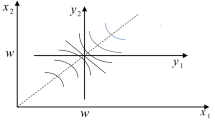Abstract
We present a framework for decision making with the possibility to express circumstance-dependent preferences among different alternatives for a decision. This new formalism, Ordered Choice Logic Programs (OCLP), builds upon choice logic programs to define a preference/specialization relation on sets of choice rules. We show that our paradigm is an intuitive extension of both ordered logic and choice logic programming such that decisions can comprise more than two alternatives which become only available when a choice is actually forced. The semantics for OCL programs is based on stable models for which we supply a characterization in terms of assumption sets and a fixpoint algorithm. Furthermore we demonstrate that OCLPs allow an elegant translation of finite extensive games with perfect information such that the stable models of the program correspond, depending on the transformation, to either the Nash equilibria or the subgame perfect equilibria of the game.
The author wishes to thank the FWO-Vlaanderen for its support.
Access this chapter
Tax calculation will be finalised at checkout
Purchases are for personal use only
Preview
Unable to display preview. Download preview PDF.
Similar content being viewed by others
References
Francesco Buccafurri, Wolfgang Faber, and Nicola Leone. Disjunctive Logic Programs with Inheritance. In Danny De Schreye, editor, International Conference on Logic Programming (ICLP), pages 79–93, Las Cruces, New Mexico, USA, 1999. The MIT Press.
Gerhardt Brewka. Reasoning about priorities in default logic. In Barbara Hayes-Roth and Richard Korf, editors, Proceedings of the Twelfth National Conference on Artificial Intelligence, pages 940–945, Menlo Park, California, 1994. American Association for Artificial Intelligence, AAAI Press.
Gerhard Brewka. Well-Founded Semantics for Extended Logic Programs with Dynamic Preferences. Journal of Articficial Intelligence Research, 4 (1996) 19–36.
Marina De Vos and Dirk Vermeir. Choice Logic Programs and Nash Equilibria in Strategic Games. In Jörg Flum and Mario Rodríguez-Artalejo, editors, Computer Science Logic (CSL’99), volume 1683of Lecture Notes in Computer Science, pages 266–276, Madrid, Spain, 1999. Springer Verslag.
Marina De Vos and Dirk Vermeir. On the Role of Negation in Choice Logic Programs. In Michael Gelfond, Nicola Leone, and Gerald Pfeifer, editors, Logic Programming and Non-Monotonic Reasoning Conference (LPNMR’99), volume 1730of Lecture Notes in Artificial Intelligence, pages 236–246, El Paso, Texas, USA, 1999. Springer Verslag.
D. Gabbay, E. Laenens, and D. Vermeir. Credulous vs. Sceptical Semantics for Ordered Logic Programs. In J. Allen, R. Fikes, and E. Sandewall, editors, Proceedings of the 2nd International Conference on Principles of Knowledge Representation and Reasoning, pages 208–217, Cambridge, Mass, 1991. Morgan Kaufmann.
Vladimir Lifschitz. Computing Circumscription. In 9th International Joint Conference on Artificial Intelligence (IJCAI-85), Los Angeles, 1985.
Martin J. Osborne and Ariel Rubinstein. A Course in Game Theory. The MIT Press, Cambridge, Massachusets, London, Engeland, third edition, 1996.
David Poole. On the Comparison of Theories: Preferring the Most Specific Explanation. In 9 th International Joint Conference on Artificial Intelligence (IJCAI-85), Los Angeles, 1985.
David Poole. The independent choice logic for modelling multiple agents under uncertainty. Artificial Intelligence, 94(1-2):7–56, 1997.
Henry Prakken and Giovanni Sartor. A system for defeasible argumentation, with defeasible priorities. In Dov M. Gabbay and Hans Jürgen Ohlbach, editors, Proceedings of the International Conference on Formal and Applied Practical Reasoning (FAPR-96), volume 1085of LNAI, pages 510–524, Berlin, June 3-7 1996. Springer.
Chiaki Sakama and Katsumi Inoue. Representing Priorities in Logic Programs. In Michael Maher, editor, Proceedings of the 1996 Joint International Conference and Symposium on Logic Programming, pages 82–96, Cambridge, September 2-6 1996. MIT Press.
Author information
Authors and Affiliations
Editor information
Editors and Affiliations
Rights and permissions
Copyright information
© 2000 Springer-Verlag Berlin Heidelberg
About this paper
Cite this paper
Vos, M.D., Vermeir, D. (2000). A Logic for Modeling Decision Making with Dynamic Preferences. In: Ojeda-Aciego, M., de Guzmán, I.P., Brewka, G., Moniz Pereira, L. (eds) Logics in Artificial Intelligence. JELIA 2000. Lecture Notes in Computer Science(), vol 1919. Springer, Berlin, Heidelberg. https://doi.org/10.1007/3-540-40006-0_27
Download citation
DOI: https://doi.org/10.1007/3-540-40006-0_27
Published:
Publisher Name: Springer, Berlin, Heidelberg
Print ISBN: 978-3-540-41131-4
Online ISBN: 978-3-540-40006-6
eBook Packages: Springer Book Archive




